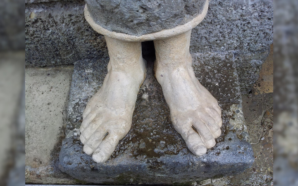In the opening chapter of Tomas Halik’s book The Afternoon of Christianity’, he states that if Christianity is to ‘become an inspiring response to the challenges of this time of great civilizational change, it must boldly transcend its previous mental and institutional boundaries. The time has come for Christianity to transcend itself.’
Christianity has managed to successfully transform itself in the past and is required to do so again if it is to remain a living dynamic tradition vital to future civilisation. Transformation will require a letting go, an emptying kenosis, of many things that have defined its religious culture but are no longer fit for purpose, while at the same time showing respect for the creedal and ritual contributions of previous eras. Much tension exists within the church, however, around what should remain, what should be let go and what new forms should be included.
The treatment of many ordained theologians is lamentable. Theologians, such as Matthew Fox and Michael Morwood, have made valuable contributions in articulating a vision of God that addresses our human needs in this era of history. The magisterium has clearly overstepped the right to judge the faith of these individuals. On the other hand, perhaps we should not be surprised by the inclination of those ordained into institutional authority, to protect that institution from perceived threats and recognise their legitimate role in preserving the creeds, doctrines and practices of our faith tradition ancestors. The words and rituals from our past represent our ancestors’ best attempts to convey their understanding of God within their historical contexts and should be respected in that sense. At the same time however, we must not let them be misconstrued as representing the final or absolute word on the mystery of God.
Tomas Halik identifies faith lived, as opposed to professed faith, as the essential ingredient and defining criteria for knowing what is worth holding on to, what must be jettisoned and what new forms must be embraced, as Christianity moves beyond its current manifestation. And at this time in human history, we must recognise that it is the ‘lived faith’ of all the faithful, not only the ordained, that is also crucial.
Transformational change within the church will not be led by the ‘institution’, despite the obvious leadership responsibilities that ordination entails. The inclination to conserve is too strong. It is time for lay Catholics to respect our spirituality, to have faith that our ‘inner voice’ is the voice of God and to embrace the freedom and baptismal licence to manifest this spiritual presence in the world. Our contemporary context is post-secular and disenchanted, yet once again is open to the spiritual dimension of life. While our ordained members are somewhat restrained by their institutional roles, lay members are free to live their faith and express their Christian spirituality in all the daily patterns of interaction with family, friendship groups, workplaces, sporting and cultural associations. It is within these everyday contexts that the voice of God needs to be heard, recognised and embraced for the sake of humanity. Lay Catholics have the freedom to be creative, to authentically engage with contemporary issues, and give expression to their spirituality within these contexts in the form of prayers, rituals, poetry, stories, art and social justice initiatives. Don’t wait for an invite or seek authority to act or expect the parish to be the structure through which new initiatives are launched. Draw from the riches of the Catholic tradition but don’t be confined to it or limited by the way it has been. Think ecumenically and broadly for God is the creative source and energy within all people. Having faith in, and being in tune with, this source of spirituality will propel Christianity’s transcendence. Death and resurrection paradoxically occur at the same time.
Michael Sibert is a parishioner in the Holy Trinity Parish of the Maitland-Newcastle Diocese, a teacher and member of the secretariat of Australian Reforming Catholics.
This article was originally published in the September 2024 edition of ARCvoice.








